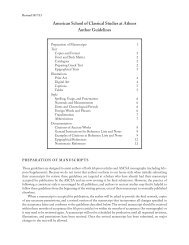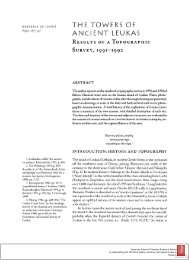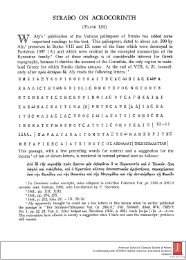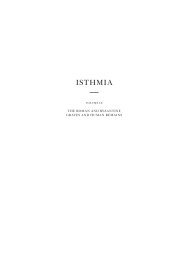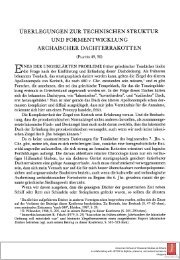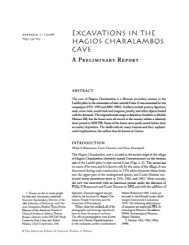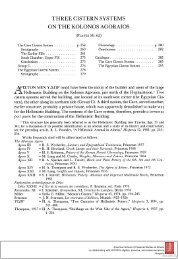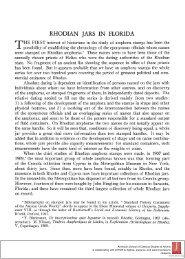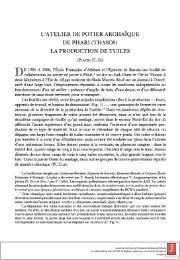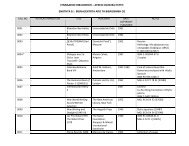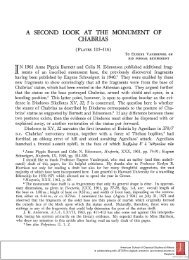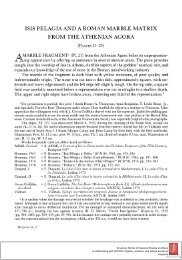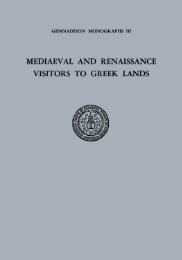the attic stelai - The American School of Classical Studies at Athens
the attic stelai - The American School of Classical Studies at Athens
the attic stelai - The American School of Classical Studies at Athens
Create successful ePaper yourself
Turn your PDF publications into a flip-book with our unique Google optimized e-Paper software.
230 W. KENDRICK PRITCHETT<br />
slumbering,125 but Rodenwaldt follows Ransom in defining it as a poetical term for<br />
couch.126 Finally, Studniczka, referring to Lucian, Symp., 8, describes it as " eine<br />
lange einheitliche Bank."<br />
In spite <strong>of</strong> so many varied definitions, <strong>the</strong>re are rel<strong>at</strong>ively few literary references<br />
to <strong>the</strong> klinter. <strong>The</strong> word is applied to Penelope's bed in Od., XVIII, 190, and to<br />
Simaetha's in <strong>The</strong>okritos, 2, 86 and 113. In both passages reference is made to<br />
sleeping, in <strong>the</strong> l<strong>at</strong>ter for a period <strong>of</strong> ten days and ten nights. Moreover, Delphis sits<br />
down beside Simaetha on <strong>the</strong> klinter, and in line 139, lektra, 'marriage-bed,' is used<br />
as a synonym. In Lucian, Symp., 8, all <strong>of</strong> <strong>the</strong> ladies who had been invited to <strong>the</strong><br />
banquet occupied one klinter, and in chapter 44 during <strong>the</strong> ensuing melee one <strong>of</strong> <strong>the</strong><br />
male guests was thrown from a klinter.<br />
Two definitions <strong>of</strong> <strong>the</strong> word are preserved in <strong>the</strong> lexicographers. Hesychius<br />
defines <strong>the</strong> klinter as &4pos JvaKXLT6', but <strong>the</strong> plural form is defined both as diphroi<br />
and as klinlai. Elsewhere in defining &4pae, presumably <strong>of</strong> <strong>The</strong>okritos 14, 41, Hesychius<br />
equ<strong>at</strong>es klinter with a woman's thronos.127 Photius says <strong>the</strong> klinter is a sort <strong>of</strong><br />
easy chair: E781o fopEiov E'o-TiV 8E K<strong>at</strong> KXtVOKa6OE8ptov. Et. Mag. (s.v. lTpO'-KXWITpOV)<br />
calls a klinter a thronos which has a back (prosklintron).<br />
<strong>The</strong> appearance <strong>of</strong> <strong>the</strong> word in our inscription shows th<strong>at</strong> Ransom and Rodenwaldt<br />
erred in considering klinter as a poetical variant <strong>of</strong> kline, and, indeed, Gow has<br />
observed th<strong>at</strong> it is "rare in serious poetry." 128 In most, but not all, <strong>of</strong> <strong>the</strong> passages<br />
it is specified th<strong>at</strong> a klinter was an article <strong>of</strong> furniture for women. Two <strong>of</strong> <strong>the</strong> passages<br />
connect <strong>the</strong> word with leaning back. In modern Greek, klinter means s<strong>of</strong>a or<br />
armchair. <strong>The</strong> composite picture th<strong>at</strong> emerges is <strong>of</strong> something like <strong>the</strong> modern chaiselongue:<br />
a semi-reclining se<strong>at</strong>, large enough for more than one person. Such a se<strong>at</strong>,<br />
from Roman times, can be seen in Daremberg-Saglio, Dictionn<strong>at</strong>ire, s.v. Ca<strong>the</strong>dra,<br />
fig. 1252.<br />
4. o-K4rovs (III, 8; V, 9).129 Mean bed, pallet. A separ<strong>at</strong>e article by Rodenwaldt<br />
is devoted to skimpous in <strong>the</strong> R.E. This is <strong>the</strong> most detailed study <strong>of</strong> <strong>the</strong> word.<br />
<strong>The</strong> brief article <strong>of</strong> Saglio in Daremberg-Saglio, Dictionnaire, s.v. Scim podiurm,<br />
contains in <strong>the</strong> footnotes <strong>the</strong> most complete list <strong>of</strong> ancient literary references.130<br />
Pollux lists <strong>the</strong> word under <strong>the</strong> genus <strong>of</strong> klinai.'3' Hesychius explains <strong>the</strong> word<br />
125 R.E., s.v. Stuhl 399.<br />
126<br />
R.E. s.v. Kline, 847; cf. Ransom, Couches and Beds, p. 109.<br />
127<br />
Gow (ad <strong>The</strong>okritos 14, 41) st<strong>at</strong>es th<strong>at</strong> <strong>the</strong> definition is "probably no more than an inference<br />
" from <strong>the</strong> <strong>The</strong>ocritean passage.<br />
128 Ad <strong>The</strong>okritos, 24, 43.<br />
129<br />
To <strong>the</strong>se two references should now be added VI, 38, where <strong>the</strong> restor<strong>at</strong>ion [cKtj]w-o8E3 may<br />
be substituted for [Kovt'] wo&S. See above, p. 208.<br />
130<br />
For <strong>the</strong> etymology <strong>of</strong> skimpous, see Walde-H<strong>of</strong>mann, L<strong>at</strong>einisches etymologisches Worterbuch,<br />
s.v. scamnum.<br />
131 X, 35.



